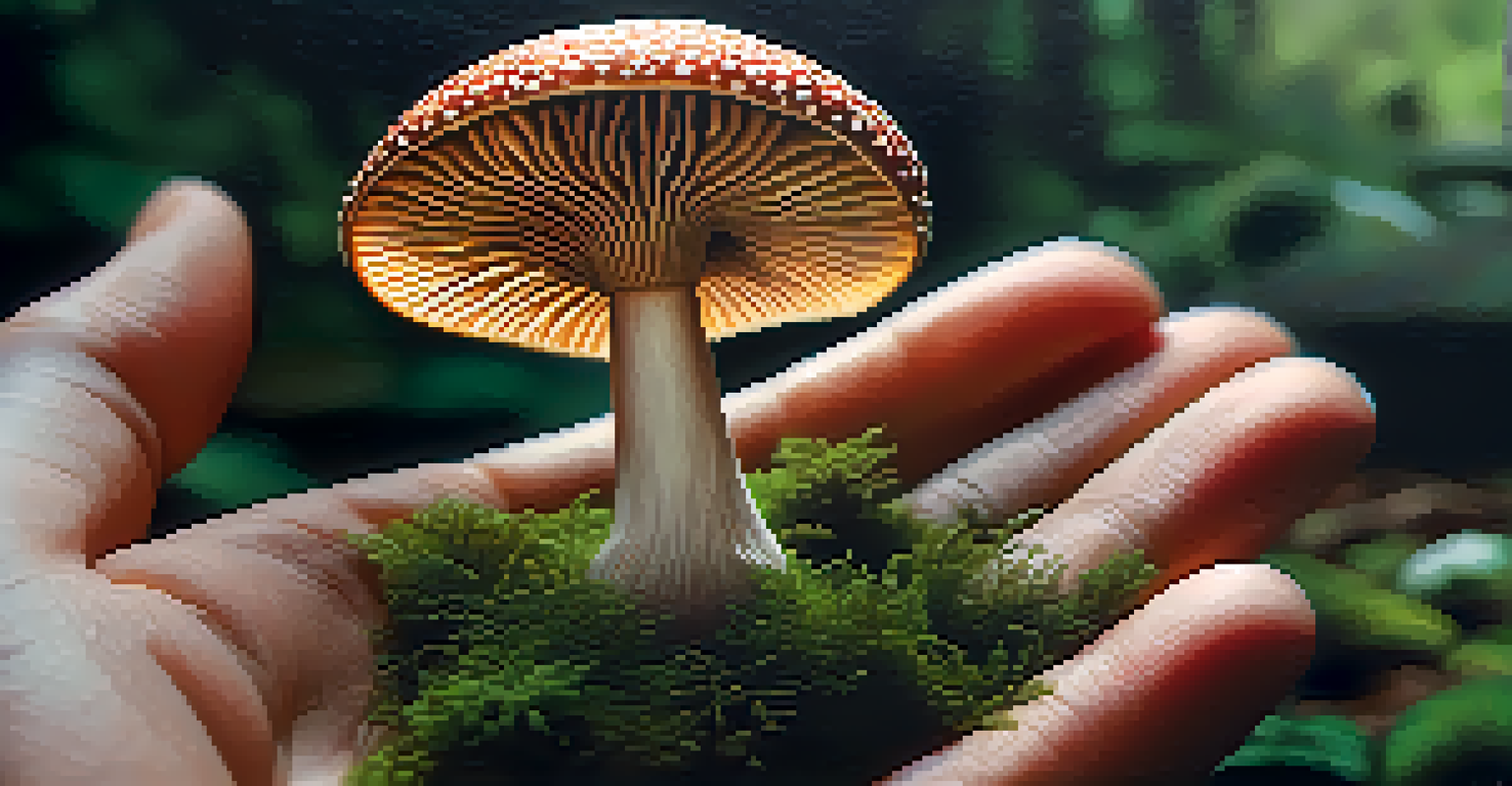Entheogens: Bridging the Gap Between Self and the Universe

What Are Entheogens and Their Historical Context?
Entheogens are substances that have been used for centuries in various cultures to facilitate spiritual experiences. Derived from Greek, the term means 'generating the divine within,' reflecting their purpose in many indigenous rituals. Historically, plants like psilocybin mushrooms and peyote have played vital roles in connecting individuals with their spirituality and the cosmos.
The greatest discovery of my generation is that a human being can alter his life by altering his attitude of mind.
In many ancient societies, these substances were not just recreational; they were sacred tools for healing and enlightenment. For example, the use of ayahuasca in Amazonian tribes is a profound journey into the self, often guided by shamans who help participants navigate their experiences. This rich history illustrates how entheogens have shaped human consciousness long before the modern era.
Today, the resurgence of interest in entheogens is prompting a reevaluation of their potential benefits. As more people seek answers beyond the material world, these substances are being recognized not just as drugs, but as keys to understanding the vast universe within and around us.
The Science Behind Entheogens: How They Affect the Brain
Research into entheogens reveals fascinating insights into how they interact with our brains. These substances often target serotonin receptors, particularly the 5-HT2A receptor, which plays a crucial role in mood regulation and perception. This interaction can lead to altered states of consciousness, enabling profound insights and emotional breakthroughs.

For instance, studies show that psilocybin can facilitate neural connectivity, effectively allowing different parts of the brain to communicate in ways they typically do not. This phenomenon might explain the feelings of unity and interconnectedness often reported by users. It's as if the brain's usual pathways are opened up, allowing fresh perspectives on life and existence.
Entheogens: Tools for Spiritual Growth
Entheogens have been used for centuries in various cultures as sacred substances to facilitate profound spiritual experiences and personal insights.
Moreover, these altered states can lead to lasting changes in personality and outlook. Many participants in clinical studies have reported increased openness and decreased anxiety, suggesting that entheogens could be valuable tools for personal growth and mental health treatment.
Entheogens in Modern Therapy: A New Frontier
The therapeutic potential of entheogens is gaining traction in the mental health community. Recent studies indicate that substances like MDMA and psilocybin can significantly reduce symptoms of PTSD and depression. This has sparked a broader conversation about integrating these substances into traditional therapeutic practices.
We are not human beings having a spiritual experience; we are spiritual beings having a human experience.
For example, in controlled settings, patients using psilocybin have experienced profound emotional releases, often resulting in significant improvements in their mental health. The combination of guided therapy and entheogenic experiences can help individuals confront and process trauma in ways that conventional therapies sometimes struggle to achieve.
As regulations begin to shift, more therapists are exploring the integration of entheogens into their practice. This exploration may not only change individual lives but could also reshape our understanding of mental health and wellness.
Cultural Perspectives: Entheogens Across the Globe
Different cultures have embraced entheogens in unique ways, reflecting diverse spiritual beliefs and practices. In indigenous cultures, these substances are often viewed as sacred, used in rituals to connect with ancestors and the divine. For instance, the use of peyote in Native American ceremonies highlights the importance of these plants in fostering community and spiritual growth.
In contrast, Western societies have historically approached entheogens with skepticism, often associating them with counterculture movements. However, as scientific research sheds light on their benefits, there is a growing recognition of their potential to enrich spiritual and psychological well-being. This shift may bridge the gap between traditional and contemporary views on spirituality.
Therapeutic Potential of Entheogens
Research shows that entheogens like psilocybin and MDMA can significantly improve mental health outcomes, including reducing symptoms of PTSD and depression.
Understanding these cultural perspectives can enhance our appreciation of entheogens' roles in various spiritual practices. It invites a broader dialogue about how these substances can contribute to individual and collective growth in today's interconnected world.
Personal Experiences: Stories of Transformation
Many individuals have reported life-changing experiences after using entheogens, often describing moments of deep connection with themselves and the universe. These personal stories highlight the transformative power of these substances, with users expressing newfound clarity and purpose. For example, someone might find themselves confronting long-held fears, leading to a sense of liberation.
Anecdotes of healing from grief or trauma are common, with users sharing how entheogens helped them process their experiences in a supportive environment. These narratives provide powerful testimonials to the potential benefits of these substances when used responsibly and mindfully. They illustrate how the journey inward can lead to profound outward changes.
While personal experiences vary widely, they often share a common theme of interconnectedness—feeling a part of something greater. This sense of unity can foster empathy and compassion, encouraging individuals to engage with the world in more meaningful ways.
Navigating Risks: Safety and Responsibility
While entheogens hold great potential, it is crucial to approach their use with caution and responsibility. Not all substances are suitable for everyone, and factors like mental health history and setting can significantly impact the experience. Educating oneself about these substances is essential for safe exploration.
In therapeutic settings, the presence of trained professionals can mitigate risks and enhance the experience. This structured environment allows for careful monitoring and support, ensuring that participants can navigate their journeys safely. Outside of clinical settings, however, users must remain vigilant about their surroundings and mindset.
Cultural Shift Towards Acceptance
As societal perceptions evolve, there is a growing recognition of entheogens as valuable tools for healing and personal growth, leading to broader acceptance and potential integration into mainstream culture.
By fostering a culture of safety and responsibility, we can help ensure that the use of entheogens remains a positive and transformative experience for individuals. Recognizing the importance of preparation and integration after experiences can also promote lasting benefits and minimize potential negative outcomes.
The Future of Entheogens: Society's Changing Perception
As research continues to unveil the benefits of entheogens, societal perceptions are gradually shifting. More people are beginning to recognize these substances not just as drugs, but as potential tools for healing and personal growth. This change in perspective is paving the way for broader acceptance and integration into mainstream culture.
With legalization efforts in various regions gaining momentum, the future of entheogens may involve more regulated access, allowing individuals to explore these substances in safe and supportive environments. This increasing acceptance can lead to a richer dialogue about spirituality, mental health, and the nature of consciousness.

Ultimately, as society embraces a more nuanced understanding of entheogens, we may find that they serve as bridges connecting us to ourselves, each other, and the universe. This journey toward acceptance could transform not just individual lives, but the collective consciousness of humanity.